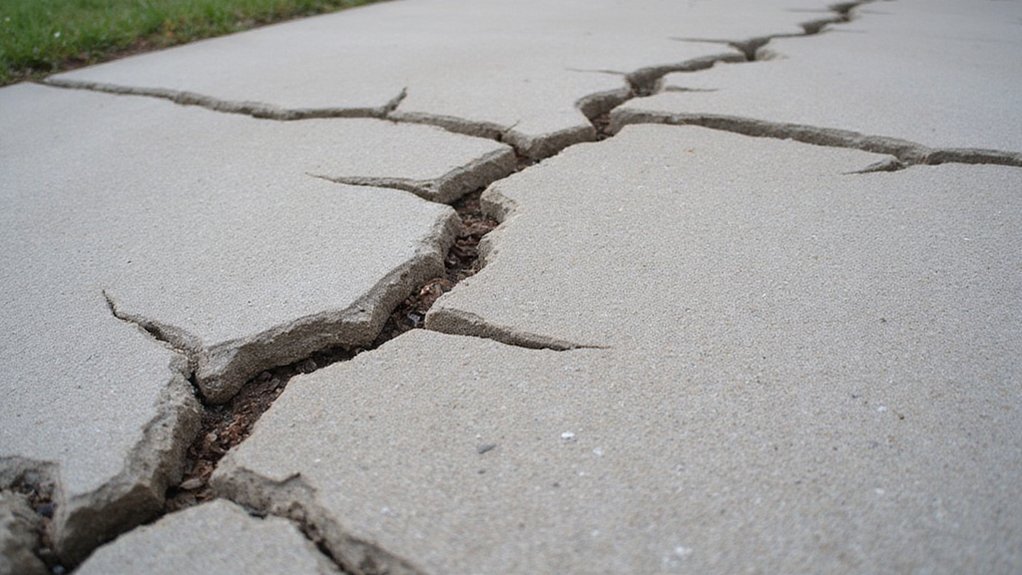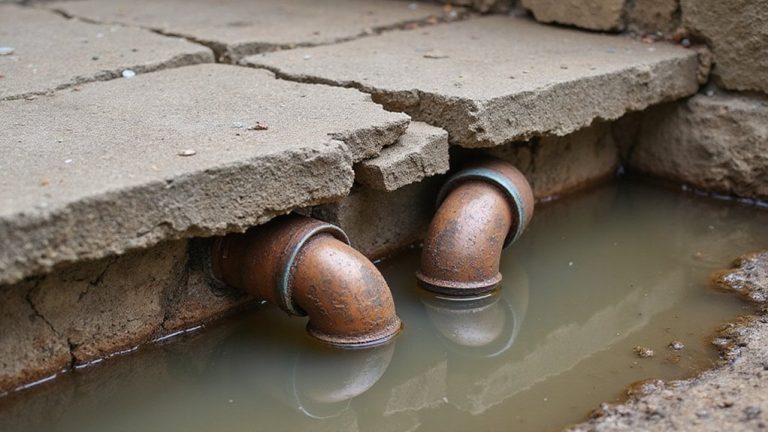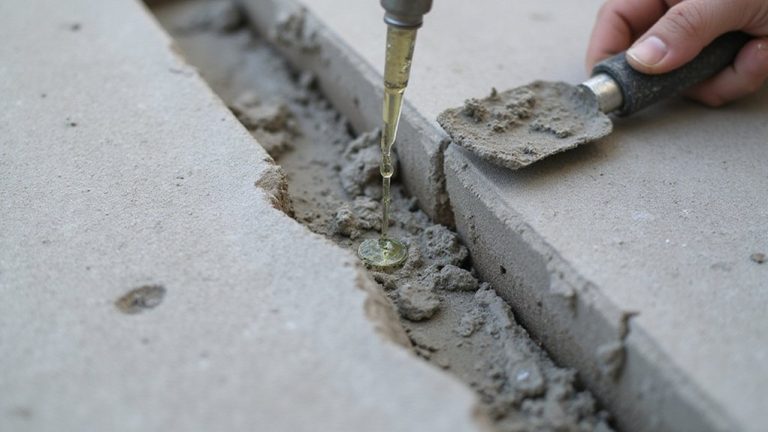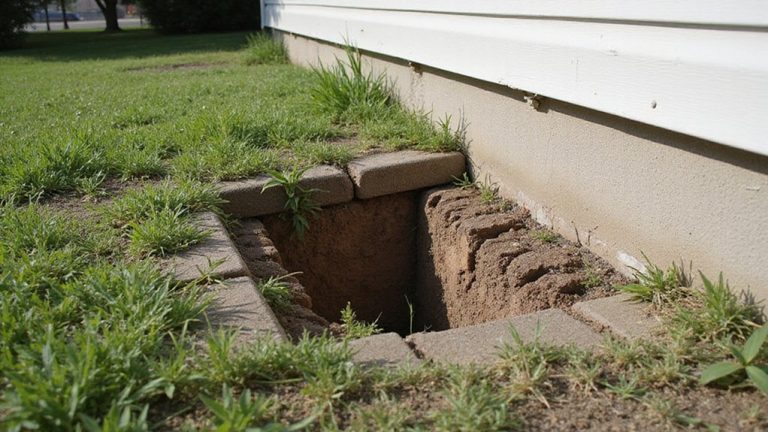If your home’s foundation is showing signs of distress, like noticeable cracks or uneven floors, it’s vital to address the issue promptly. Ignoring these warning signs can lead to more extensive and costly damage down the line. By understanding the common indicators of foundation problems, you’ll be better equipped to take the necessary steps to stabilize your home’s structural integrity and prevent further complications.
Cracks in the Foundation
Although cracks in your home’s foundation may seem alarming, it’s crucial to comprehend that not all cracks signify a severe problem. Hairline cracks, for example, are often caused by the natural settling of soil over time and are generally not a cause for concern. However, larger cracks, especially those that are wider than a pencil or continue to grow, may indicate a more serious issue, such as soil erosion or foundation settling. It’s of utmost importance to have a professional evaluate the cracks and determine the underlying cause to guarantee the structural soundness of your home. Prompt inspection and repair by a local professional contractor can prevent further damage.
Uneven or Sinking Floors
If you notice that your floors are uneven or sinking, this could be a sign of foundation issues. Uneven floors often indicate that the foundation has shifted or settled, compromising the structural integrity of your home. This can happen due to moisture buildup, soil erosion, or other factors that put stress on the foundation. Sinking floors are particularly concerning, as they suggest that the foundation has gravely weakened and may be in need of immediate repair. Addressing these problems promptly is vital to maintain the safety and stability of your home.
Gaps Around Windows and Doors
Gaps around windows and doors are another potential indicator of foundation troubles. If you notice these gaps developing, it may be a sign that your home’s foundation is shifting or settling due to unstable soil.
- Gaps around windows that allow air to flow through
- Doors that no longer close properly or stick in the frame
- Windows that become difficult to open and close
- Noticeable cracks forming around window and door frames
- Gaps appearing between the wall and the window or door trim
Foundation shifting or settling soil can lead to these unwanted gaps, which may worsen over time if left unaddressed. Addressing these issues promptly is vital to maintain the structural integrity of your home.
Sticking Windows and Doors
Sticking windows and doors can be another telltale sign that your home’s foundation may be in need of attention. When the foundation shifts, it can cause the frames of your windows and doors to become misaligned, making them stick or difficult to open and close.
This issue is often accompanied by damaged weatherstripping, which compromises the seal and allows air to leak in. These problems not only create frustrating inconveniences but can also contribute to energy inefficiency and potential structural problems. Addressing foundation issues promptly can help restore the proper functioning of your windows and doors.
Sloping or Tilting Chimneys
Another common sign of foundation trouble is a sloping or tilting chimney. A leaning chimney often indicates that your home’s foundation is shifting or sinking. This can be a serious issue, as it can compromise the structural integrity of your home.
Uneven floors or walls
Cracks in the bricks or mortar of the chimney
Gaps between the chimney and the roof
Doors and windows that no longer close properly
Visible separation between the chimney and the home’s exterior
If you notice any of these signs, it’s important to have a professional inspect your foundation and address the problem before it worsens.
Bowing or Bulging Walls
Bowing or bulging walls can also be a troubling sign of foundation issues. These leaning walls indicate an unstable structure, which could worsen over time.
Bulging walls often result from excessive soil pressure or moisture damage, causing the foundation to shift and the walls to bow outward. This structural compromise can ultimately lead to cracks, window/door misalignment, and even collapse if left unattended.
Addressing bowing or bulging walls promptly is essential to maintain the safety and integrity of your home. A professional foundation repair assessment can identify the underlying causes and recommend the appropriate solution to stabilize your home.
Sagging Roof or Porch
If you notice your roof or porch sagging, it could be a concerning sign of foundation problems. Sagging can indicate:
- Crumbling concrete supports that can no longer properly hold the weight
- Deteriorating pier pads that have become unstable
- Shifting or settling of the foundation, causing uneven weight distribution
- Rotting or damaged wooden beams and joists
- Loose, unstable connections between the roof/porch and the home’s structure
These issues require prompt attention to prevent further damage and guarantee the safety of your home. Addressing sagging roof or porch problems early can help avoid costly repairs down the line.
Drainage Issues
Unaddressed drainage issues can also be a telling sign of potential foundation problems. If you notice puddling water around your home’s perimeter or compromised landscaping, it’s vital to tackle these drainage concerns promptly. Improper drainage can lead to soil erosion, which in turn can undermine your foundation’s stability.
Don’t wait until the problem escalates. Take action to make sure water flows away from your home effectively. Addressing drainage issues head-on can help safeguard your foundation and prevent more extensive, costly repairs down the line. Stay vigilant for these signs and prioritize resolving drainage problems for the well-being of your home’s foundation.
Frequently Asked Questions
Is Foundation Repair Covered by Insurance?
Whether foundation repair is covered by your insurance depends on the types of coverage you have. Determining your eligibility requires reviewing your policy, so contact your provider to understand what’s included and how to file a claim.
How Much Does Foundation Repair Typically Cost?
Foundation repair costs can vary greatly, but the average repair costs typically range from $4,000 to $10,000. The exact price depends on the extent of the damage and the complexity of the repairs needed.
How Long Does Foundation Repair Take to Complete?
The timeline for foundation repair varies based on cost estimates and factors like the extent of damage, accessibility, and the repair method. It can take anywhere from a few days to several weeks to complete.
Can I Fix My Foundation Myself?
While you may be tempted to tackle DIY foundation projects, it’s best to consult a professional. Structural integrity concerns require expert assessment to guarantee your home’s safety and prevent further damage.
How Do I Find a Reliable Foundation Contractor?
Finding a reliable foundation contractor can be tricky, but it’s essential. Get cost estimates, consider timeline, and look for reviews that show the contractor cares about your home’s needs and making you feel secure.



